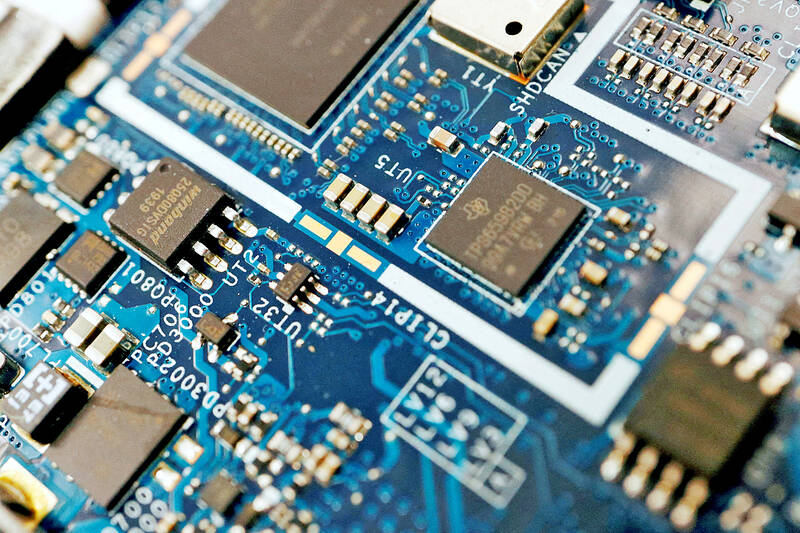Taiwan has asked to join discussions centered on China’s protest against US semiconductor sanctions at the WTO, seeking a voice in a debate that could have ramifications for the global chip industry.
Taipei has formally requested a seat at the table when consultations begin, based on the outsized role it plays in global chipmaking, the government said in a statement filed at the WTO.
China filed a dispute with the WTO in an effort to overturn US-imposed export controls, which aim to limit its ability to develop a domestic semiconductor industry and equip its military.

Photo: Reuters
Beijing accused Washington of economic protectionism, undermining trade rules and jeopardizing the global supply chain.
The US has pressured allies from Seoul to Tokyo to go along with the restrictions on China.
Taipei’s goal in seeking to join the WTO negotiations is to better understand how the dispute might affect global semiconductors, the Office of Trade Negotiations said in a statement yesterday.
Taiwan produces the vast majority of the world’s most advanced semiconductors, and its largest companies, including Taiwan Semiconductor Manufacturing Co (台積電), have abided by the US curbs.
“Taiwan is requesting to join the consultation procedure to understand the supply-demand situation of chips,” the agency said.
The nation has no intention of supporting China’s complaint, nor does the move imply “any dissatisfaction with the United States’ measures,” it added.
US trade officials said they plan to travel to Taipei for trade talks later this month.
Japan and the Netherlands have agreed in principle to join the US in tightening controls over the export of advanced chip tech to China, and they are likely to adopt at least some of the sweeping measures rolled out in October to restrict the sale of equipment to Chinese firms.
However, even if China is successful with its case, the WTO lacks the ability to force the US to reverse its actions. Coupled with domestic economic turmoil, the curbs have hobbled a plethora of China’s biggest chip firms.
China’s semiconductor firms are facing new challenges at home with Beijing now shying away from lavishing them with colossal resources, as was done in the past.
It is pausing massive chip investments as a nationwide COVID-19 resurgence strains the world’s No. 2 economy and Beijing’s finances, and top officials are discussing alternatives to costly subsidies that have not rendered concrete results, but instead encouraged graft and the US sanctions.

AIR SUPPORT: The Ministry of National Defense thanked the US for the delivery, adding that it was an indicator of the White House’s commitment to the Taiwan Relations Act Deputy Minister of National Defense Po Horng-huei (柏鴻輝) and Representative to the US Alexander Yui on Friday attended a delivery ceremony for the first of Taiwan’s long-awaited 66 F-16C/D Block 70 jets at a Lockheed Martin Corp factory in Greenville, South Carolina. “We are so proud to be the global home of the F-16 and to support Taiwan’s air defense capabilities,” US Representative William Timmons wrote on X, alongside a photograph of Taiwanese and US officials at the event. The F-16C/D Block 70 jets Taiwan ordered have the same capabilities as aircraft that had been upgraded to F-16Vs. The batch of Lockheed Martin

GRIDLOCK: The National Fire Agency’s Special Search and Rescue team is on standby to travel to the countries to help out with the rescue effort A powerful earthquake rocked Myanmar and neighboring Thailand yesterday, killing at least three people in Bangkok and burying dozens when a high-rise building under construction collapsed. Footage shared on social media from Myanmar’s second-largest city showed widespread destruction, raising fears that many were trapped under the rubble or killed. The magnitude 7.7 earthquake, with an epicenter near Mandalay in Myanmar, struck at midday and was followed by a strong magnitude 6.4 aftershock. The extent of death, injury and destruction — especially in Myanmar, which is embroiled in a civil war and where information is tightly controlled at the best of times —

China's military today said it began joint army, navy and rocket force exercises around Taiwan to "serve as a stern warning and powerful deterrent against Taiwanese independence," calling President William Lai (賴清德) a "parasite." The exercises come after Lai called Beijing a "foreign hostile force" last month. More than 10 Chinese military ships approached close to Taiwan's 24 nautical mile (44.4km) contiguous zone this morning and Taiwan sent its own warships to respond, two senior Taiwanese officials said. Taiwan has not yet detected any live fire by the Chinese military so far, one of the officials said. The drills took place after US Secretary

THUGGISH BEHAVIOR: Encouraging people to report independence supporters is another intimidation tactic that threatens cross-strait peace, the state department said China setting up an online system for reporting “Taiwanese independence” advocates is an “irresponsible and reprehensible” act, a US government spokesperson said on Friday. “China’s call for private individuals to report on alleged ‘persecution or suppression’ by supposed ‘Taiwan independence henchmen and accomplices’ is irresponsible and reprehensible,” an unnamed US Department of State spokesperson told the Central News Agency in an e-mail. The move is part of Beijing’s “intimidation campaign” against Taiwan and its supporters, and is “threatening free speech around the world, destabilizing the Indo-Pacific region, and deliberately eroding the cross-strait status quo,” the spokesperson said. The Chinese Communist Party’s “threats